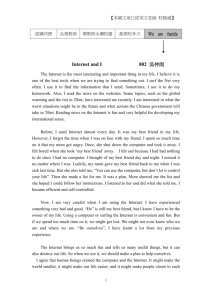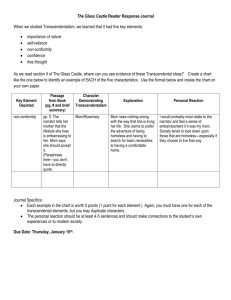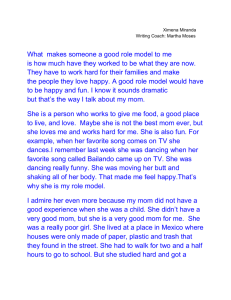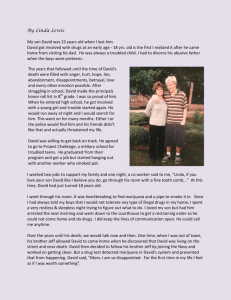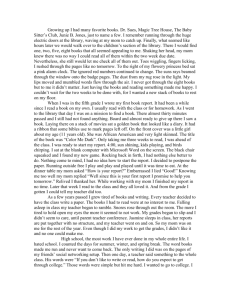MENAGERIE Katie Lange Dolan
advertisement
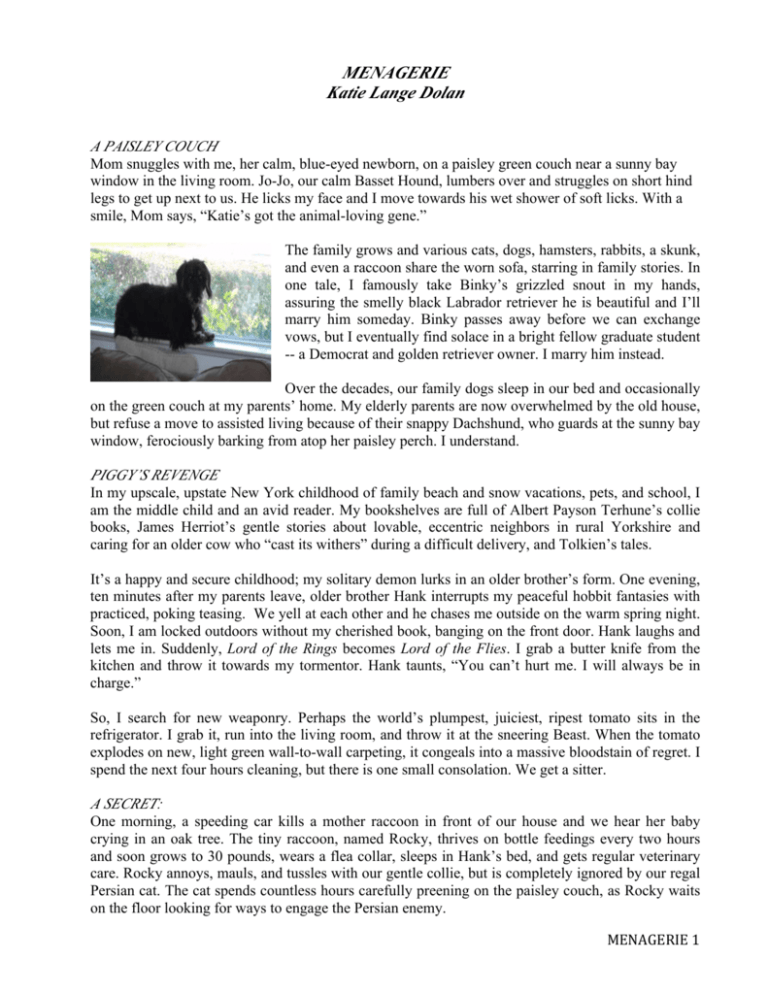
MENAGERIE Katie Lange Dolan A PAISLEY COUCH Mom snuggles with me, her calm, blue-eyed newborn, on a paisley green couch near a sunny bay window in the living room. Jo-Jo, our calm Basset Hound, lumbers over and struggles on short hind legs to get up next to us. He licks my face and I move towards his wet shower of soft licks. With a smile, Mom says, “Katie’s got the animal-loving gene.” The family grows and various cats, dogs, hamsters, rabbits, a skunk, and even a raccoon share the worn sofa, starring in family stories. In one tale, I famously take Binky’s grizzled snout in my hands, assuring the smelly black Labrador retriever he is beautiful and I’ll marry him someday. Binky passes away before we can exchange vows, but I eventually find solace in a bright fellow graduate student -- a Democrat and golden retriever owner. I marry him instead. Over the decades, our family dogs sleep in our bed and occasionally on the green couch at my parents’ home. My elderly parents are now overwhelmed by the old house, but refuse a move to assisted living because of their snappy Dachshund, who guards at the sunny bay window, ferociously barking from atop her paisley perch. I understand. PIGGY’S REVENGE In my upscale, upstate New York childhood of family beach and snow vacations, pets, and school, I am the middle child and an avid reader. My bookshelves are full of Albert Payson Terhune’s collie books, James Herriot’s gentle stories about lovable, eccentric neighbors in rural Yorkshire and caring for an older cow who “cast its withers” during a difficult delivery, and Tolkien’s tales. It’s a happy and secure childhood; my solitary demon lurks in an older brother’s form. One evening, ten minutes after my parents leave, older brother Hank interrupts my peaceful hobbit fantasies with practiced, poking teasing. We yell at each other and he chases me outside on the warm spring night. Soon, I am locked outdoors without my cherished book, banging on the front door. Hank laughs and lets me in. Suddenly, Lord of the Rings becomes Lord of the Flies. I grab a butter knife from the kitchen and throw it towards my tormentor. Hank taunts, “You can’t hurt me. I will always be in charge.” So, I search for new weaponry. Perhaps the world’s plumpest, juiciest, ripest tomato sits in the refrigerator. I grab it, run into the living room, and throw it at the sneering Beast. When the tomato explodes on new, light green wall-to-wall carpeting, it congeals into a massive bloodstain of regret. I spend the next four hours cleaning, but there is one small consolation. We get a sitter. A SECRET: One morning, a speeding car kills a mother raccoon in front of our house and we hear her baby crying in an oak tree. The tiny raccoon, named Rocky, thrives on bottle feedings every two hours and soon grows to 30 pounds, wears a flea collar, sleeps in Hank’s bed, and gets regular veterinary care. Rocky annoys, mauls, and tussles with our gentle collie, but is completely ignored by our regal Persian cat. The cat spends countless hours carefully preening on the paisley couch, as Rocky waits on the floor looking for ways to engage the Persian enemy. MENAGERIE 1 We teach Rocky basic raccoon survival skills, hoping he can successfully return to the wild. During the summer, Mom teaches the young raccoon to swim -- snorkeling circles in a shallow tide pool as the young raccoon paddles, complains, and follows her snorkel tube. When Rocky disappears in late December, we’re sad yet glad he’ll enjoy a full raccoon life in the woods. One cold morning, there is a familiar scratch at the back door and Rocky scampers into the kitchen, chortling, scolding, and grunting an entire symphony of happy raccoon sounds. He tells us the secret location of his hiberrrrrnation – a perfect onomatopoeia for a cold winter’s sleep. He smells of oak leaves and dry bugs. We gather in a circle on the speckled linoleum kitchen floor. Rocky greets each of us, softly patting the furless skin on our cheeks, like someone deciphering Braille. Mom says, “He’s a dermatologist searching for new wrinkles and blemishes.” We fuss and offer sweet, juicy apples. The collie wags his tail, welcoming his nemesis. Rocky walks to the pantry and jumps right into a 25-pound bag of dog food. It is warm in the bag -- smells like heaven to a hungry raccoon -- and we leave him alone during his gorging session. Soon, Rocky finishes, carefully washes his hands in the collie’s water bowl, and wanders upstairs for a nap on Hank’s bed. Later that spring, a neighbor murders Rocky for late night snacking and familiar knowledge of his garbage cans. On cold February evenings when wild animals slumber in their secret hibernation trees, I remember Rocky’s soft paws on my face as he briefly reached across the wide divide between humans and wild creatures. LOVES LOST: It is love at first sight. We meet at Middlebury College and work together summers at the Dog Team, a famous tourist restaurant known for sticky buns and home style cooking. Don is attractive, smart, funny, and nice to my friends. He is also tall, athletic, and a great tennis player. Even his thankless first real job -- convincing independent, irascible Vermonters to give up their Chevy trucks to commute in state-sponsored vanpools -- is admirable. Yet, differences loom. Don grew up in New Jersey, where girls wore heavy make up and dressed in shimmery sheath dresses long before The Real Housewives. His family’s suburban home was immaculate; outward appearances mattered; and people hid their emotions under an amicable veneer. With my wooden clogs, un-coiffed hair, solid frame, and willingness to tussle with life, I do not fit his wifely ideal. He is equivocal about a possible engagement. Despite the relationship’s uncertain future, I choose a graduate program close enough for weekend trips to the yellow Vermont farmhouse that Don shared with a roommate. It is love at first sight. Don’s housemate brings a 12 week-old black Labrador retriever puppy home one afternoon. Sleek, sweet Jessica is technically not my dog, but I feed her and race her to the swimming hole each day. She sleeps at the foot of our bed. Jessica is my constant companion as I struggle with calculus all summer preparing for graduate school. I miss her when I head off to school. It is eerily quiet at the tiny farmhouse when I arrive on a late October Friday after another week of humbling business school economics classes. Don suggests going to a nice restaurant in Norwich. He is nervous and unreadable. For a big guy, he is surprisingly afraid of confrontation. He finally confesses, “My housemate decided Jessica was too much work. He gave her to the farmer down the street.” MENAGERIE 2 Two loves lost. I spend the rest of the weekend sobbing. A giant crack appears in Don’s perfect pedestal. Why didn’t he push back with his roommate? Why didn’t he call and include me in the decision? Don went along. He didn’t fight for me; he hadn’t been fighting for our relationship. It is the beginning of a long season of tears and endless repetitions of Fleetwood Mac’s Landslide: “I’ve been afraid of changing, because I’ve built my life around you.” Don went on to live in New Jersey, work in marketing for Estee Lauder, and marry a perky Jersey gal. It’s been years since I’ve thought of that yellow farmhouse, but recently Bella, my lumbering Newfoundland puppy, fell in love with a tiny Cocker Spaniel at obedience school. Given the young dogs’ growing differences, the love relationship was doomed. Bella happily tussles with her current beau -- a large Poodle. He gives it right back to her. The Poodle and Bella are like Peter and me. We tussle, compete, and play by the same rules. In addition to loving dogs, we share similar life views on children, parents, family, and the many gray areas of life. The day after we moved into our new home in Larchmont, we drove north to “just look” at a litter of puppies. We came home that night with Jason, our first golden retriever. HOLY COW: Hoping a walk might jump-start my labor after nine months and two weeks, I take Jason, our golden retriever, for an early evening stroll. The dog runs joyous circles, as I take measured, ponderous steps. Betsy and Wendy, her 9-year old daughter, get out of their station wagon and come over to say hello. Betsy asks, “So, are you still working?” “Yes, but tomorrow’s my last day. If nothing happens by Friday, I’ll be induced.” ‘You’re going to Greenwich Hospital, right? Harry, the thin guy on Overlook Terrace whose wife ran off, had his colon surgery there. He complained about the surgical nurses and said he would never go back …” Wendy points and me and interrupts, “Is she the cow?” Betsy laughs and continues loudly, “Harry said there is a nursing contract dispute and….” Wendy interrupts again, ‘Mommy, you said she was a cow.” “No, no, honey, I said, ‘Holy Cow! Is she still pregnant?” “No, Mommy. That’s not what you said.” WWJD –What Would James Herriot Do? Be kind, calm, and bovine. I smile placidly, saying, “Well, I’ll keep you posted and we’ll get the boys together for a play date soon.” I amble barn-ward, hoping I don’t cast my withers. Two days later, my second son, Tim, is born. We’ll teach him to be kind like James. LEAVING HOME: Two decades later, Tim carefully folds and packs his clothes in special clear plastic containers selected to fit under a dorm bed. Peter, who knows a great deal about many things, but very little mechanical engineering or physics, lashes Tim’s belongings to the car roof and, as we accelerate to 75 miles an hour on Rt. 684, the crossed bungee cords grow taut and then snap. Several loud thumps later, we slow down and pull onto the shoulder. We laugh nervously, watching three lanes of traffic break madly to a halt amidst large piles of clothes and plastic. Tim’s entire wardrobe is scattered along a half-mile stretch of highway. MENAGERIE 3 In this real life version of Frogger, we dart and weave, collecting tee shirts and blue jeans. Drivers pass by smiling; scowling; or ignoring us until a shiny BMW pulls over and its angry driver gets out to examine the windshield nick left by a flying clear plastic container. Phone numbers are exchanged and the BMW departs. Watching Peter and Tim reclaim the clothes, I remember a younger Tim, who became a casualty of Whole Language teaching when we relocated to Indiana and an elementary school that expected second graders to read. Tim was tutored daily after school for six weeks, but then learned he was going to repeat first grade. On his day of demotion, he walked into the classroom backwards. Tim always navigates obstacles -- a smart driver, slowing down when needed or recalibrating his GPS. On the superhighway, he holds up a previously pristine college sweatshirt. It has been run over by an 18-wheeler -- huge tire marks are indelibly etched across its chest. Tim offers his kind, calm Matt Damon-like smile. He is ready to get back on the road. LET TIME GO LIGHTLY We are exhausted, yet satisfied, finishing another long day of training as Hank, Peter, and I prepare for the Hawaii Ironman triathlon. Deciding to go watch-less during the race, I say, “I’ll be like Harry Chapin and Let Time Go Lightly.” Hank smiles, pours glasses of white wine, and we walk to the beach at sunset to admire a placid green sea turtle resting in the sand. Two mornings later, I adjust my goggles and scull in clear, calm waters near the Kona pier, surrounded by 1,849 intense competitors sporting expensive Timex Ironman watches. One woman says, in a thick foreign accent; “I’m looking for my spouse.” I cheerily respond that I, too, am racing with my husband. She offers a stern Germanic stare. I realize she’d said “space” and she wants me to vacate her ocean turf. Soon, the starter cannon booms and racers swim over, under, and around me in a churning frenzy – like spawning salmon swimming upstream. Suddenly, I feel mammary coolness and glance down. My Speedo is askance -- a “wardrobe malfunction” on display for the oblivious dolphins. I quickly re-adjust my bathing suit and emerge from the water in front of TV cameras. Looking around me rather than at a watch, I admire the massive longextinct volcanoes, asleep and gentle in pink early morning light. Hours later, as I reach the bike turnaround in hilly Havi, the repetitiveness of pedal rotations becomes soothing, almost restful, despite gathering heat and wind. The hot day eventually cools down and I start the run with six hours before a midnight cut off when Cinderella’s carriage becomes a pumpkin. Another spectacular Hawaiian sunset spreads over the black lava fields. Tight quads soon slow me down to the “Kona shuffle,” an uncomfortable hybrid of running and walking. Although brightly lit aid stations offer hot chicken soup, music, and upbeat chats with volunteers about the pace needed for a midnight finish, the road is dark and lonely. Time does not go lightly. MENAGERIE 4 Finally, I run down Alii Drive under bright lights, cross the finish line, and hug Peter, whose wearing the cherished finisher’s t-shirt. We return to the cold Northeast. Hank learns his daughter is anorexic, our parents’ health falls apart, and I acquire a new boss who smirks rather than smiles. No one told me that sunset glass of wine with my brother four years ago would be one of the last times I’d let time go lightly. MERMAIDS and SEA-BRAS Visiting my parents at their winter rental on Marco Island, I take Mom for a swim in the calm Gulf. Mom, nearly blind and recovering from hip surgery, uses a cane to hobble slowly across the wide, white expanse of Resident’s Beach. She is like a sea turtle: slow and uneven on the land, but she’ll be fast and graceful when she finally reaches the ocean. I adjust my pace and walk carefully beside her. There are many older, retired people on the beach, but few venture into the small swells. I examine the beach’s gifts from the sea. Millions of whitish-gray, weather-beaten shells – retirees from past lives themselves – lay jumbled together in a thick littoral line. Grey and yellowish toenail shells are elderly feet in need of a pedicure, while lumpy red/purple shells are like streaked, burned sunbathers. Waiting for Mom after my swim, I recall a beach vacation forty years ago. Mom announces in front of the entire family she’s found a special gift from the sea just for me. It is a seaweed-encrusted, AA cup, bleached white bra. While my pre-teen friends enjoy lunch and brassiere shopping at Macy’s in a feminine rite of passage with their Moms, I am offered worn salvage of the seas. As an underdeveloped, shy 12 year old, the Sea-bra mortifies and I wear it only once before reverting to undershirts. Mom does better for my sixteenth birthday, giving me ‘A Gift from the Sea,’ celebrating the beauty of seashells and women’s myriad relationships. It asks, “How can one learn to take the trough of the wave?” and “How can one learn to live through the ebb-tides of one’s existence?” The Florida sunbathers watch Mom slowly emerge from the water in her heavy wetsuit, as she searches for me and for her cane. They ask her age, ask how often she swims, and sometimes ask to take a picture of this admirable mermaid. It is a rare, glorious moment in the sun for an eighty-six year old woman in the ebb tide of existence. Today, I forgive her for the Sea-bra and accept her more enduring gifts -- lessons about mermaids, books, graceful aging, and the perfect curl of a blue wave. I’m already sad at the thought of swimming alone. DUTCH BREEZE: We pedal twenty kilometers through red, orange and salmon colored tulip fields to a Dutch Masters museum. In flat, bike-centric, helmet-free Holland, I feel wind on my forehead and my long bangs float in a hyacinth-rich breeze. Shelly, my petite, intellectual, non-conformist childhood friend, rides ahead. She’s lived in Leiden since graduating from college. Shelly is a violinist married to a medieval music expert, with two sons and a European life full of concerts, travel, and drama. At the museum, we step quietly through a narrow wood door and immediately see a large Jan de Heem painting – a tornado of giant, vivid flowers erupts from a shimmering blue vase as a MENAGERIE 5 yellow butterfly hovers. It is stunning. We simultaneously exclaim, “Ahhhhh. One of my favorites.” Shelly and I are kindred spirits, agreeing on dogs, smooth-edged tulips, books, kayaks, and Indonesian food. Across an ocean of waves and life changes, we’ve stayed in touch through holiday cards, email, and Skype. When I finally pierce my ears at age 35, Shelly, who’d seen me wear shirts to school inside out but never ever wear lipstick or mascara, emails, “Good. They’ll give the appearance that you care.” She knows me. We bike back to Leiden and sit down for tea at her yellow kitchen table. The picture window frames a Dutch tableau of bright sunshine reflecting off water, barges, kayaks, and a motionless windmill on the canal’s far bank. Shelly’s son, Alexander, is a theater student preparing for rigorous auditions. The three of us talk about everything - King Henry in Shakespeare, Nicole Kidman’s great performance in Rabbit Hole, and Hermione’s bad acting in Harry Potter. I feel welcome in this world of literature, drama, and music, perhaps more at home than in my Larchmont world of golfers, bridge players, and Wall Street financiers. Shelly says, “It’s funny. You’ve been married to a successful businessman for 30 years, socialize with Republican suburbanite friends, and own three houses, yet somehow that does not define you. You remain you.” I’m becalmed lately. I’ve been drifting -- after sending a healthy, cherished, yet crazy, dog to death row for his serial biting incidents, experiencing the diminished dreams of middle age, and watching my elderly parents fall apart. Pedaling through the hyacinths, admiring a Dutch masterpiece, and sitting at that bright yellow table with my oldest friend and her son put wind back in my sails. The breeze picks up, as the old windmill across the canal creaks and slowly turns. Time goes lightly again until a phone call about Dad’s admission to the hospital for aspiration pneumonia and various other ailments. He is frail, but rallying. Mom reports that their dachshund stands vigil on the ancient paisley couch, awaiting my father and mournfully gazing out the window. Dad spends his 87th birthday in a rehabilitation hospital bed. Mom and Hank bring the dog to the hospital parking lot, then bundle Dad up and bring him outside. Dad and Dachshund enjoy a joyous birthday reunion. We understand. MENAGERIE 6


